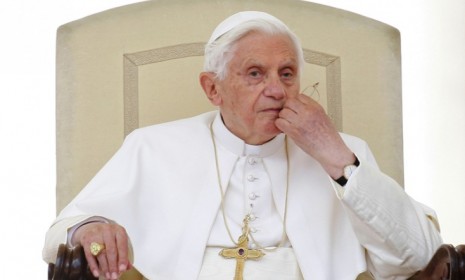Why the Vatican hired a Fox News reporter: 4 theories
Conspiracy theorists, start your engines: The pope just poached a "Fair and Balanced" reporter to hone the Holy See's media message

A free daily email with the biggest news stories of the day – and the best features from TheWeek.com
You are now subscribed
Your newsletter sign-up was successful
The Roman Catholic Church is having a rough time in the public relations department: Frequent leaks on infighting and corruption among Pope Benedict XVI's top advisers have embarrassed the Vatican, a crackdown on American nuns is drawing bad press, and a long-running child sex-abuse scandal made headlines again Friday thanks to the monumental child-endangerment conviction of a Philadelphia prelate. Now, the Holy See has a new strategy to resolve this media mess: Hiring Fox News journalist Greg Burke as senior communications adviser. Burke, who is also a member of the conservative Catholic group Opus Dei — the antagonists in The Da Vinci Code — likens his new role to that of the White House's top media strategist. "You're shaping the message," he says, and "you're trying to make sure everyone remains on-message." Why did the Vatican tap a Fox News alum for this job? Here, four theories:
1. No one spins like Fox
"When it comes to the spin wars, having God on your side is not enough," says Canada's Maclean's. Fox, on the other hand, is a supremely useful ally. In other words, if you "need your scandals whitewashed," says Bridgette P. LaVictoire at Lez Get Real, "just bring in someone from Fox News to do it for you." Burke has all the right qualifications to be an extraordinary "propaganda minister."
The Week
Escape your echo chamber. Get the facts behind the news, plus analysis from multiple perspectives.

Sign up for The Week's Free Newsletters
From our morning news briefing to a weekly Good News Newsletter, get the best of The Week delivered directly to your inbox.
From our morning news briefing to a weekly Good News Newsletter, get the best of The Week delivered directly to your inbox.
2. Pope Benedict likes Burke's Opus Dei ties
Calling in an outside journalist from the ranks of Opus Dei has worked for the Holy See before, says John Hooper in Britain's The Guardian. The late Pope John Paul II poached a Spanish journalist, Joaquin Navarro-Valls, to be his longtime spokesman, with remarkable success. Benedict has also increasingly turned to Opus Dei for help. The chief investigator of the "VatiLeaks" scandal is Cardinal Juilán Herranz — a member of Opus Dei. Even Fox's Burke acknowledges the potential importance of his Opus Dei ties. "It might come into play," he told the AP. "We'll leave it to the world's conspiracy theorists and remaining Da Vinci Code obsessives to figure out what that means," says Caroline Bankoff at New York.
3. America's bishops want more American influence in Rome
"Some Vatican watchers called the move a power play by media-savvy Americans — including Cardinal Timothy M. Dolan," the New York archbishop and current head of the U.S. bishops' conference, says Rachel Donadio in The New York Times. It's fairly obvious to the Americans that the blame-the-media strategy from the Italian-dominated Vatican is failing. Just last week, Burke's new boss, Vatican Secretary of State Cardinal Tarcisio Bertone, accused the press of working with Satan and "imitating Dan Brown" in its VatiLeaks coverage. U.S. bishops seem to hope that Burke can reimagine the Vatican's strategy, and better represent the Americans' preferred approach.
A free daily email with the biggest news stories of the day – and the best features from TheWeek.com
4. The Vatican simply needs outside professional help
Burke himself sees a variety of factors behind the Vatican's courting of him, and "being American certainly plays into it," he tells The Daily Beast's Barbie Latza Nadeau. "If you want conspiracy theory, it's the American Fox News and Opus Dei connection," he adds, but "if you want the experience factors, I have a solid career in journalism, and I do know essentially what journalists want." What they want is the truth, and hiring a respected reporter authorized to brief journalists on background is "a giant step into the brave new world of transparency for the Holy See," says Nadeau. Yes, hiring a pro from outside the world of Catholic media might help drag the pope's "public-relations operation out of the dark ages," says Michael Day in Britain's The Independent.
-
 The ‘ravenous’ demand for Cornish minerals
The ‘ravenous’ demand for Cornish mineralsUnder the Radar Growing need for critical minerals to power tech has intensified ‘appetite’ for lithium, which could be a ‘huge boon’ for local economy
-
 Why are election experts taking Trump’s midterm threats seriously?
Why are election experts taking Trump’s midterm threats seriously?IN THE SPOTLIGHT As the president muses about polling place deployments and a centralized electoral system aimed at one-party control, lawmakers are taking this administration at its word
-
 ‘Restaurateurs have become millionaires’
‘Restaurateurs have become millionaires’Instant Opinion Opinion, comment and editorials of the day